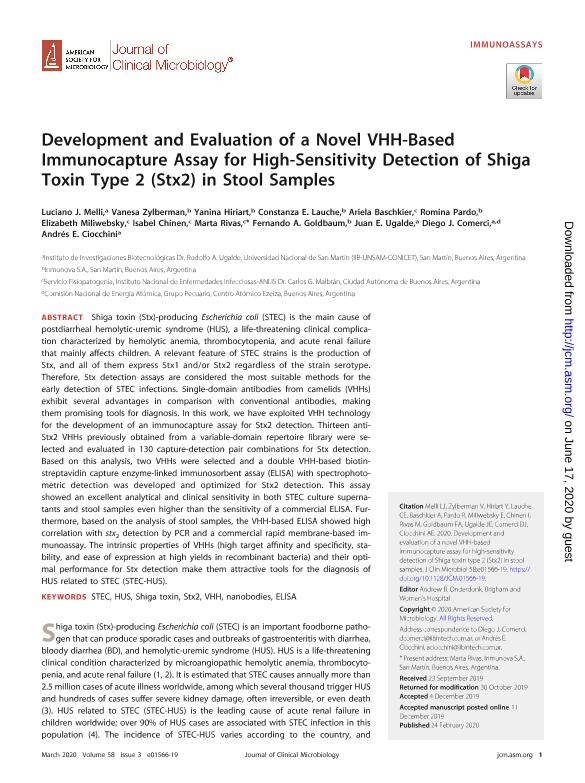Artículo
Development and evaluation of a novel VHH-based immunocapture assay for high-sensitivity detection of Shiga toxin type 2 (Stx2) in stool samples
Melli, Luciano Jorge ; Zylberman, Vanesa
; Zylberman, Vanesa ; Hiriart, Yanina
; Hiriart, Yanina ; Lauche, Constanza E.; Baschkier, Ariela; Pardo, Romina; Miliwebsky, Elizabeth; Chinen, Isabel; Rivas, Marta; Goldbaum, Fernando A.; Ugalde, Juan Esteban
; Lauche, Constanza E.; Baschkier, Ariela; Pardo, Romina; Miliwebsky, Elizabeth; Chinen, Isabel; Rivas, Marta; Goldbaum, Fernando A.; Ugalde, Juan Esteban ; Comerci, Diego José
; Comerci, Diego José ; Ciocchini, Andres Eduardo
; Ciocchini, Andres Eduardo
 ; Zylberman, Vanesa
; Zylberman, Vanesa ; Hiriart, Yanina
; Hiriart, Yanina ; Lauche, Constanza E.; Baschkier, Ariela; Pardo, Romina; Miliwebsky, Elizabeth; Chinen, Isabel; Rivas, Marta; Goldbaum, Fernando A.; Ugalde, Juan Esteban
; Lauche, Constanza E.; Baschkier, Ariela; Pardo, Romina; Miliwebsky, Elizabeth; Chinen, Isabel; Rivas, Marta; Goldbaum, Fernando A.; Ugalde, Juan Esteban ; Comerci, Diego José
; Comerci, Diego José ; Ciocchini, Andres Eduardo
; Ciocchini, Andres Eduardo
Fecha de publicación:
02/2020
Editorial:
American Society for Microbiology
Revista:
Journal of Clinical Microbiology
ISSN:
0095-1137
Idioma:
Inglés
Tipo de recurso:
Artículo publicado
Clasificación temática:
Resumen
Shiga toxin (Stx)-producing Escherichia coli (STEC) is the main cause of postdiarrheal hemolytic-uremic syndrome (HUS), a life-threatening clinical complication characterized by hemolytic anemia, thrombocytopenia, and acute renal failure that mainly affects children. A relevant feature of STEC strains is the production of Stx, and all of them express Stx1 and/or Stx2 regardless of the strain serotype. Therefore, Stx detection assays are considered the most suitable methods for the early detection of STEC infections. Single-domain antibodies from camelids (VHHs) exhibit several advantages in comparison with conventional antibodies, making them promising tools for diagnosis. In this work, we have exploited VHH technology for the development of an immunocapture assay for Stx2 detection. Thirteen anti- Stx2 VHHs previously obtained from a variable-domain repertoire library were selected and evaluated in 130 capture-detection pair combinations for Stx detection. Based on this analysis, two VHHs were selected and a double VHH-based biotinstreptavidin capture enzyme-linked immunosorbent assay (ELISA) with spectrophotometric detection was developed and optimized for Stx2 detection. This assay showed an excellent analytical and clinical sensitivity in both STEC culture supernatants and stool samples even higher than the sensitivity of a commercial ELISA. Furthermore, based on the analysis of stool samples, the VHH-based ELISA showed high correlation with stx2 detection by PCR and a commercial rapid membrane-based immunoassay. The intrinsic properties of VHHs (high target affinity and specificity, stability, and ease of expression at high yields in recombinant bacteria) and their optimal performance for Stx detection make them attractive tools for the diagnosis of HUS related to STEC (STEC-HUS).
Palabras clave:
ELISA
,
HUS
,
NANOBODIES
,
SHIGA TOXIN
,
STEC
,
STX2
,
VHH
Archivos asociados
Licencia
Identificadores
Colecciones
Articulos (IIBIO)
Articulos de INSTITUTO DE INVESTIGACIONES BIOTECNOLOGICAS
Articulos de INSTITUTO DE INVESTIGACIONES BIOTECNOLOGICAS
Citación
Melli, Luciano Jorge; Zylberman, Vanesa; Hiriart, Yanina; Lauche, Constanza E.; Baschkier, Ariela; et al.; Development and evaluation of a novel VHH-based immunocapture assay for high-sensitivity detection of Shiga toxin type 2 (Stx2) in stool samples; American Society for Microbiology; Journal of Clinical Microbiology; 58; 3; 2-2020; 1-15
Compartir
Altmétricas



